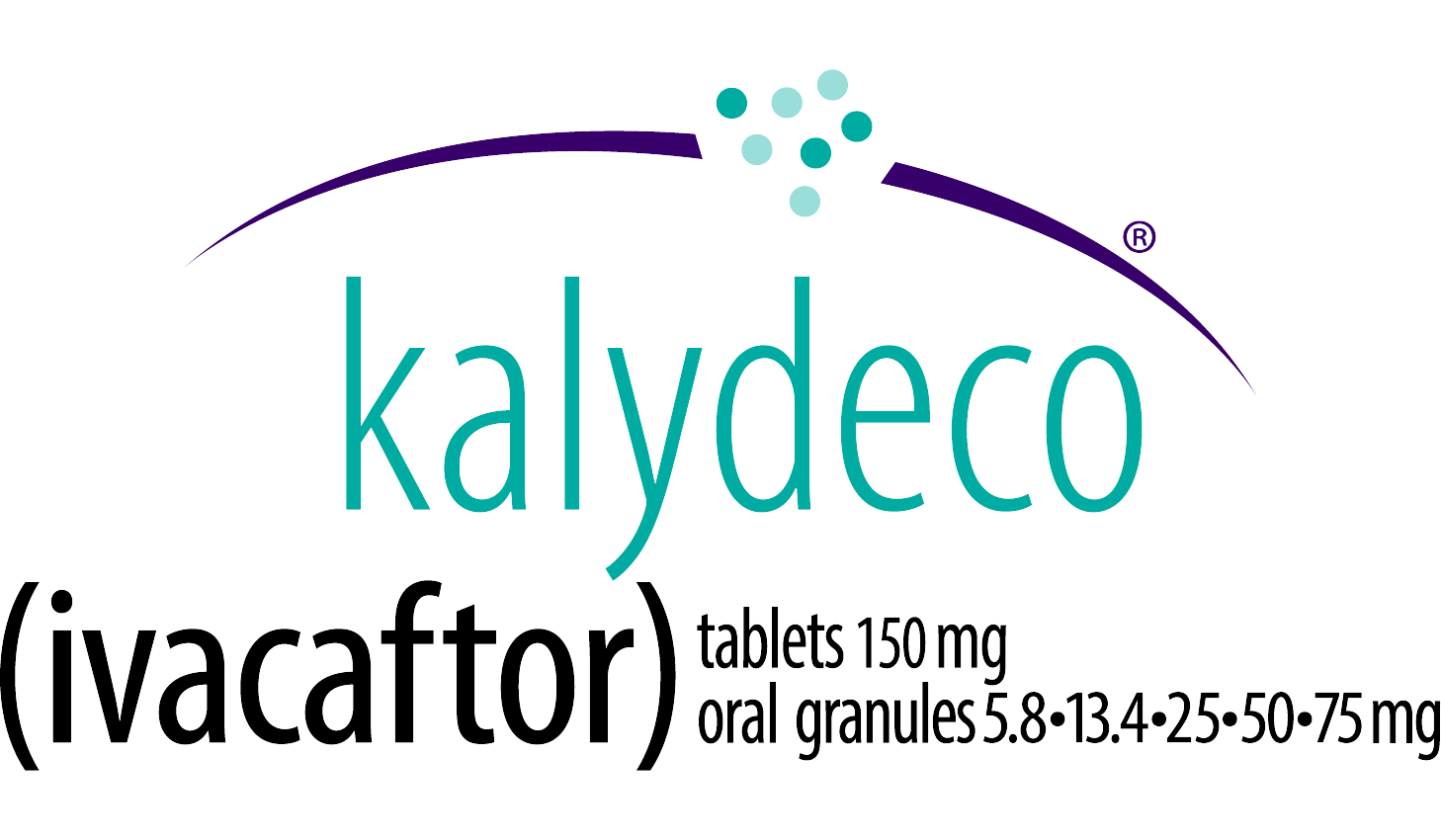Clinical Trials for Patients Age 1 Month to <2 Years
TRIAL 8 (ARRIVAL): KALYDECO® (ivacaftor) in patients with CF age 1 month to <2 years.1-3
ON THIS PAGE: Study Design | Safety Profile | Pharmacodynamic Results
STUDY DESIGN
- Trial 8 was a Phase 3, 24-week, open-label, 2-part study of KALYDECO that included the following cohorts of patients with CF: Patients age 1 to <4 months (n=7), 4 to <6 months (n=6), patients age 6 to <12 months (n=11) and patients age 12 to <24 months (n=19)1-3
- Patients were eligible if they had a G551D, G1244E, G1349D, G178R, G551S, R117H,a S1251N, S1255P, S549N, or S549R mutation2-4
- 1 to <4 months cohort: Patients had any ivacaftor-responsive mutation (n=7)
- 4 to <6 months cohort: Patients had either a G551D mutation (n=5) or a R117H mutation (n=1)2
- 6 to <12 months cohort: Patients had either a G551D mutation (n=10) or a G178R mutation (n=1)2
- 12 to <24 months cohort: Patients had either a G551D mutation (n=16), a S549N mutation (n=2), or a G178R mutation (n=1)3
- Patients were eligible if they had a G551D, G1244E, G1349D, G178R, G551S, R117H,a S1251N, S1255P, S549N, or S549R mutation2-4
- Patients in this trial received KALYDECO every 12 hours with fat-containing food, in addition to their prescribed CF therapies. In the 4 to <6 months cohort, patients received 25 mg of KALYDECO oral granules every 12 hours until reaching 6 months of age, after which they could receive 50 mg of KALYDECO oral granules if they weighed 7 kg or more. Patients 6 months and older received KALYDECO every 12 hours based on weight: 5 kg to <7 kg: one 25 mg packet of oral granules, 7 kg to <14 kg: one 50 mg packet of oral granules; ≥14 kg: one 75 mg packet of oral granules
- Instruction was provided to administer KALYDECO oral granules mixed with 5 mL of an age-appropriate soft food or liquid, either orally with a syringe or with a spoon, every 12 hours along with a fat-containing food. Bottle use was not recommended2,3
Primary endpoint2,3: Safety, assessed by adverse events (AEs) and clinical laboratory assessments
Select secondary endpoints2,3: Absolute change from baseline in sweat chloride concentration at Week 24
aPatients with the R117H mutation were only eligible to enroll in this study in regions where ivacaftor was approved for use in patients with the R117H mutation.
Trial 8 limitations2,3,5:
- The study was open label and not placebo controlled; therefore, causality cannot be attributed to KALYDECO
- This study was unblinded, which may have introduced bias related to awareness of treatment
SAFETY PROFILE
Discontinuation and serious AEs
- 1 to <4 months cohort (n=7):
- 1 patient discontinued treatment during the trial due to transaminase elevation - 4 to <6 months cohort (n=6)2,5:
- No treatment discontinuations
- 1 serious AE included bronchiolitis - 6 to <12 months cohort (n=11)2:
- Serious AEs included viral respiratory tract infection (n=1), viral rash (n=1), and cough (n=1) - 12 to <24 months cohort (n=19)3:
- 1 patient withdrew due to difficulty with blood draws
- 4 serious AEs occurred in 2 patients3- 1 patient had constipation, distal intestinal obstruction syndrome (DIOS), and eczema herpeticum
- The serious adverse event of constipation was considered possibly related to ivacaftor by the investigator3
- 1 patient had persistent cough requiring hospitalization for two weeks and treatment with intravenous antibiotics3
- 1 patient had constipation, distal intestinal obstruction syndrome (DIOS), and eczema herpeticum
All other serious AEs were considered unrelated or unlikely to be related to ivacaftor2,3
The safety profile of patients in this trial is similar
to that observed in patients age 2 years and older.1
Transaminase elevations1,2
| INCIDENCE OF TRANSAMINASE ELEVATIONS1,2 |
||||
|---|---|---|---|---|
| ELEVATED ALT OR AST | 1 TO <4 MONTHS COHORT n/N (%) | 4 TO <6 MONTHS COHORT n/N (%) | 6 TO <12 MONTHS COHORT n/N (%) | 12 TO <24 MONTHS COHORT n/N (%) |
| >3x ULN | 0/7 (0.0) | 0/6 (0.0) | 1/11 (9.1) | 5/18 (27.8) |
| >5x ULN | 0/7 (0.0) | 0/6 (0.0) | 0/11 (0.0) | 2/18 (11.1) |
| >8x ULN | 1/7 (14.3) | 0/6 (0.0) | 0/11 (0.0) | 2/18 (11.1) |
| INCIDENCE OF TRANSAMINASE ELEVATIONS1,2 |
|||
|---|---|---|---|
| ELEVATED ALT OR AST | >3x ULN | >5x ULN | >8x ULN |
| 1 TO <4 MONTHS COHORT n/N (%) | 0/7 (0.0) | 0/7 (0.0) | 1/7 (14.3) |
| 4 TO <6 MONTHS COHORT n/N (%) | 0/6 (0.0) | 0/6 (0.0) | 0/6 (0.0) |
| 6 TO <12 MONTHS COHORT n/N (%) | 1/11 (9.1) | 0/11 (0.0) | 0/11 (0.0) |
| 12 TO <24 MONTHS COHORT n/N (%) | 5/18 (27.8) | 2/18 (11.1) | 2/18 (11.1) |
ALT, alanine aminotransferase. AST, aspartate aminotransferase. ULN, upper limit of normal.
- 1 to <4 months cohort: 1 patient discontinued treatment due to transaminase elevations
- No patients in the 4 to <6 months, 6 to <12 months, or 12 to <24 months cohorts discontinued ivacaftor treatment due to transaminase elevations1
Please see Important Safety Information for more information about transaminase elevations reported in patients with CF receiving KALYDECO.
PHARMACODYNAMIC RESULTS1-3
Observed reduction in sweat chloride from baseline:
Patients age 1 to <4 months
−40.3 mmol/L
- In the 1 to <4 months cohort (n=5), the mean absolute change from baseline in sweat chloride was -40.3 mmol/L (95% CI: -76.6, -4.1) at Week 24 (secondary endpoint)
Patients age 4 to <6 months
-50.0 mmol/L
- In the 4 to <6 months cohort (n=3), the mean absolute change from baseline in sweat chloride was -50.0 mmol/L (95% CI: -93.1, -6.9) at Week 24 (secondary endpoint)1
Patients age 6 to <12 months
-58.6 mmol/L
- In the 6 to <12 months cohort (n=6), the mean absolute change from baseline in sweat chloride was -58.6 mmol/L (95% CI: -75.9, -41.3) at Week 24 (secondary endpoint)1,2
Patients age 12 to <24 months
-73.5 mmol/L
- In the 12 to <24 months cohort (n=10), the mean absolute change from baseline in sweat chloride was −73.5 mmol/L (95% CI: −86.0, −61.0) at Week 24 (secondary endpoint)1,3
There was no direct correlation between decrease in sweat chloride levels and improvement in lung function (FEV1).1
AE, adverse event; CI, confidence interval.
IMPORTANT SAFETY INFORMATION
WARNINGS AND PRECAUTIONS
Transaminase (ALT or AST) Elevations
- Elevated transaminases have been reported in patients with CF receiving KALYDECO. Transaminase elevations were more common in patients with a history of transaminase elevations or in patients who had abnormal transaminases at baseline. ALT and AST should be assessed prior to initiating KALYDECO, every 3 months during the first year of treatment, and annually thereafter. For patients with a history of transaminase elevations, consider more frequent monitoring of liver function tests
- Patients who develop increased transaminase levels should be closely monitored until the abnormalities resolve. Dosing should be interrupted in patients with ALT or AST of greater than 5 times the upper limit of normal (ULN). Following resolution of transaminase elevations, consider the benefits and risks of resuming KALYDECO
INDICATIONS AND USAGE
KALYDECO is indicated for the treatment of cystic fibrosis (CF) in patients age 1 month and older who have at least one mutation in the CFTR gene that is responsive to ivacaftor potentiation based on clinical and/or in vitro assay data.
If the patient's genotype is unknown, an FDA-cleared CF mutation test should be used to detect the presence of a CFTR mutation followed by verification with bi-directional sequencing when recommended by the mutation test instructions for use.
INDICATIONS AND USAGE
KALYDECO is indicated for the treatment of cystic fibrosis (CF) in patients age 1 month and older who have at least one mutation in the CFTR gene that is responsive to ivacaftor potentiation based on clinical and/or in vitro assay data.
If the patient's genotype is unknown, an FDA-cleared CF mutation test should be used to detect the presence of a CFTR mutation followed by verification with bi-directional sequencing when recommended by the mutation test instructions for use.
IMPORTANT SAFETY INFORMATION
WARNINGS AND PRECAUTIONS
Transaminase (ALT or AST) Elevations
- Elevated transaminases have been reported in patients with CF receiving KALYDECO. Transaminase elevations were more common in patients with a history of transaminase elevations or in patients who had abnormal transaminases at baseline. ALT and AST should be assessed prior to initiating KALYDECO, every 3 months during the first year of treatment, and annually thereafter. For patients with a history of transaminase elevations, consider more frequent monitoring of liver function tests
- Patients who develop increased transaminase levels should be closely monitored until the abnormalities resolve. Dosing should be interrupted in patients with ALT or AST of greater than 5 times the upper limit of normal (ULN). Following resolution of transaminase elevations, consider the benefits and risks of resuming KALYDECO
Hypersensitivity Reactions, Including Anaphylaxis
- Hypersensitivity reactions, including cases of anaphylaxis, have been reported in the postmarketing setting. If signs or symptoms of serious hypersensitivity reactions develop during treatment, discontinue KALYDECO and institute appropriate therapy. Consider the benefits and risks for the individual patient to determine whether to resume treatment with KALYDECO
Concomitant Use With CYP3A Inducers
- Use of KALYDECO with strong CYP3A inducers, such as rifampin, substantially decreases the exposure of ivacaftor, which may reduce the therapeutic effectiveness of KALYDECO. Co-administration of KALYDECO with strong CYP3A inducers, such as rifampin, rifabutin, phenobarbital, carbamazepine, phenytoin, and St. John's wort is not recommended
Cataracts
- Cases of non-congenital lens opacities/cataracts have been reported in pediatric patients treated with KALYDECO. Baseline and follow-up ophthalmological examinations are recommended in pediatric patients initiating treatment with KALYDECO
ADVERSE REACTIONS
Serious Adverse Reactions
- Serious adverse reactions, whether considered drug-related or not by the investigators, which occurred more frequently in patients treated with KALYDECO included abdominal pain, increased hepatic enzymes, and hypoglycemia
Most Common Adverse Reactions
- The most common adverse reactions in the 221 patients treated with KALYDECO were headache (17%), upper respiratory tract infection (16%), nasal congestion (16%), nausea (10%), rash (10%), rhinitis (6%), dizziness (5%), arthralgia (5%), and bacteria in sputum (5%)
- The safety profile for the CF patients enrolled in clinical trials (Trials 3-8) was similar to that observed in the 48-week, placebo-controlled trials (Trials 1 and 2)
USE IN SPECIFIC POPULATIONS
Pediatric Use
- The safety and effectiveness of KALYDECO in patients with CF younger than 1 month of age have not been established. The use of KALYDECO in children under the age of 1 month is not recommended
- Use of KALYDECO in patients aged 1 to less than 6 months born at a gestational age less than 37 weeks has not been evaluated
Click here to access full Prescribing Information.
References:
1. KALYDECO [prescribing information]. Boston, MA: Vertex Pharmaceuticals Incorporated; August 2023. 2. Davies JC, Wainwright CE, Sawicki GS, et al. Ivacaftor in infants aged 4 to <12 months with cystic fibrosis and a gating mutation: results of a 2-part phase 3 clinical trial. Am J Respir Crit Care Med. 2020; doi: 10.1164. 3. Rosenfeld M, Wainwright CE, Higgins M, et al. Ivacaftor treatment of cystic fibrosis in children aged 12 to <24 months and with a CFTR gating mutation (ARRIVAL): a phase 3 single-arm study. Lancet Respir Med. 2018;6(7):545-553. 4. Rosenfeld M, Wainwright CE, Higgins M, et al. Ivacaftor treatment of cystic fibrosis in children aged 12 to <24 months and with a CFTR gating mutation (ARRIVAL): a phase 3 single-arm study. Lancet Respir Med. 2018;6(7)(suppl):553. 5. Rosenfeld M, Wainwright CE, Sawicki GS, et al. Ivacaftor in 4- to <6-month-old infants with cystic fibrosis and a gating mutation: results of a 2-part, single-arm, phase 3 study. Poster presented at: the 34th Annual North American Cystic Fibrosis Conference (virtual), October 7-23, 2020.

